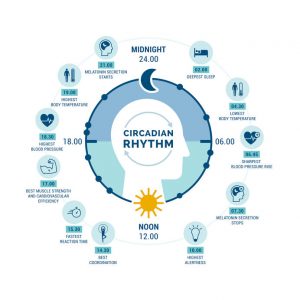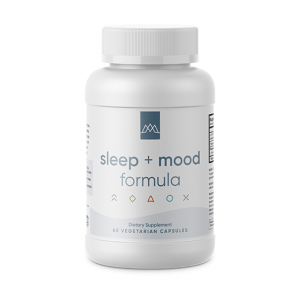What is circadian rhythm?
Year after year, we learn new things you can do, eat, or take to improve your health. Yet, when it comes to putting together a program that can make a measurable quality of life difference, quality sleep always tops the charts. That’s because we repair, restore, and reenergize our cells when we sleep. This is controlled by our circadian rhythm – a powerful master clock that activates your daily cycles of sleep and wakefulness, hunger and digestion, hormonal activity, and other bodily processes.
Unfortunately, when we don’t get enough sleep, we can experience poor memory and focus. This, over time, can lead to reduced immune function, high blood pressure, and changes in mood. These problems aren’t simply caused by less sleep, they manifest when our lifestyle is out of sync with our circadian rhythm.
In this article, we’ll explore how your circadian rhythm controls your sleep/wake cycles and how to improve it to recharge energy, boost hormones, and support a balanced, healthy lifestyle.
Circadian Rhythm, and Sleep–Wake Cycles
 Circadian rhythms are guided by natural signs that you should be awake like light exposure, interaction with people, and planned mealtimes. They run in 24-hour cycles and are part of the body’s internal clock. This system, or program, runs in the background performing critical functions and biological processes. One of the most well-known and important circadian rhythms is the sleep-wake cycle.
Circadian rhythms are guided by natural signs that you should be awake like light exposure, interaction with people, and planned mealtimes. They run in 24-hour cycles and are part of the body’s internal clock. This system, or program, runs in the background performing critical functions and biological processes. One of the most well-known and important circadian rhythms is the sleep-wake cycle.
Several systems in the body follow circadian rhythms and are synchronized in the brain with a master clock. This master clock is directed by environmental signs, most often daylight, which is why circadian rhythms are connected to the cycle of day and night.
When coordinated properly, a circadian rhythm promotes consistent and restorative sleep. But when this circadian rhythm is thrown off, it can create significant sleeping problems, including insomnia.
Circadian rhythm and your health
Research is mounting that shows chronic disruption of your circadian rhythm is related to metabolic syndrome, cancer, diabetes, and cardiovascular disease.
Inflammation
If you follow health news you may think that all inflammation is bad.
It isn’t.
Inflammation is part of your immune system’s natural response to heal an injury or fight an infection. The trouble is, it’s supposed to stop after coming on the scene to heal you. Yet, it often becomes a long-lasting habit in your body, that can be bad for you. The goal is to have a healthy inflammatory response that steers clear of long-term, or “chronic,” inflammation that leads to several diseases and poor health conditions.
When your circadian rhythm is in sync, the pro-inflammatory response peaks at nighttime, while anti‐inflammatory factors peak during daytime. This is considered part of a normal immune response which provides a built-in limitation that guards against chronic inflammation.
Heart health
Various heart functions, including cardia output, blood pressure and heart rate, are regulated by the circadian clock. More specifically, in the morning you are more susceptible to platelet aggregation, which is when blood platelets stick to each other and cause blockage. These changes may play a role in the relative high number of early morning cardiovascular events.
Disruption of 24-h rhythms leads to cardiovascular disease, including heart failure, heart attacks, and arrhythmias.
Circadian rhythm sleep disorders
 Circadian rhythm sleep disorders are caused by delays, advances, and complete dysregulation of a person’s circadian cycle. These disorders can take different forms – though, for most, disturbed sleep and excessive daytime sleepiness are common symptoms.
Circadian rhythm sleep disorders are caused by delays, advances, and complete dysregulation of a person’s circadian cycle. These disorders can take different forms – though, for most, disturbed sleep and excessive daytime sleepiness are common symptoms.
People who work during the night are called shift workers. These people, or those whose job schedules include late night and/or early morning hours are more likely to develop problems with their circadian rhythm because they are working when this system is sending out signals that promote sleep and sleep cycles. Jobs considered shift work include the following.
- Emergency Room Doctors
- Air Traffic Controllers
- Nurses
- Police Officers
- Firefighters
- Paramedic/EMTs
How to reset and keep your circadian rhythm operating properly
 Keeping a regular sleep schedule will help reset your circadian rhythm. The reset can be done simply by going to sleep and waking up at the same time every day.
Keeping a regular sleep schedule will help reset your circadian rhythm. The reset can be done simply by going to sleep and waking up at the same time every day.
If you are a shift worker, you may want to invest in blackout curtains, so your bedroom is as dark as possible. Then, if you wake up when it is dark outside, you will want to get some bright lights (referred to a bright light therapy) to emulate waking up to daylight.
In addition, it is important to support restful sleep and mood balance with MaxLiving Sleep + Mood Formula. This science backed nutritional supplement aids in the production of serotonin and melatonin, which are critical to getting deep restful sleep, and resetting your circadian rhythm. Serotonin is a natural neurotransmitter made in the body that functions to support healthy sleep cycles, mood, and food intake. Melatonin is most often used for insomnia and improving sleep in different conditions. For example, it is used for jet lag, for adjusting sleep-wake cycles in people whose daily work schedule changes (shift-work disorder), and for helping people establish a day and night cycle.
About the Author
 Zach Zovath graduated with a Bachelor’s degree in Exceptional Education from the University of Central Florida. He continued on to receive his Master’s degree from the College of Education and Human Performance at the University of Central Florida. He is a master level personal trainer, coach, and health consultant. In addition, his specializations include corrective exercise, performance enhancement, prenatal/postpartum core stability, and exercise therapy. As a result of his education and experience in the health and fitness industry, he has developed fast and effective exercise programs for health care facilities.
Zach Zovath graduated with a Bachelor’s degree in Exceptional Education from the University of Central Florida. He continued on to receive his Master’s degree from the College of Education and Human Performance at the University of Central Florida. He is a master level personal trainer, coach, and health consultant. In addition, his specializations include corrective exercise, performance enhancement, prenatal/postpartum core stability, and exercise therapy. As a result of his education and experience in the health and fitness industry, he has developed fast and effective exercise programs for health care facilities.
References
https://www.cdc.gov/niosh/emres/longhourstraining/clock.html
https://my.clevelandclinic.org/health/diseases/12115-circadian-rhythm-disorders
https://www.news-medical.net/health/Circadian-Rhythm.aspx


